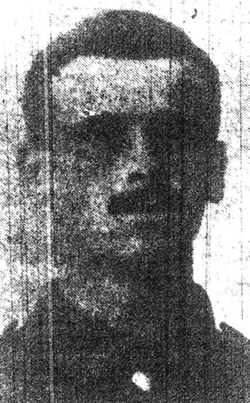 E M Jones
E M Jones He joined the Army in August 1914 at the outbreak of the First World War, and embarked for France the following summer on 1 June.
Ironically, in the Courier of 30 July 1915, a letter from Private Jones (in the column LETTERS FROM LOCAL MEN ON ACTIVE SERVICE), which showed his obvious delight in, and talent for, writing, was printed on the same page as the report of his sadly premature death.
 Former offices of High Brooms Brick Company
Former offices of High Brooms Brick Company “During the lull in the firing I now – as a lad from 111, Camden-road, Tunbridge Wells, have pleasure in sending you a narrative of ‘Trench Warfare’ which I shall be pleased to see published for the benefit of the readers. Perhaps you wonder what the trenches are like. This is just a brief idea. The first thing that meets the eye is one long, zig-zag line. In front of this line is another, and so on, ad lib. A nearer view shows you a deep cutting or trench divided into bays, each with a ledge inside on which to stand when firing. The depth may be from seven to nine feet, counting from the top of the innumerable sandbags. The trench should be deep and narrow, with dug-outs in the square bays opposite the firing steps. This is the main trench. Smaller ones are dug leading out of these, either backwards or forwards, to trenches behind or in front, respectively.
These are the communication trenches, up which the rations, ammunitions, etc, are brought. There is something very fascinating about the field of action. Take a peep over the parapet at night, when a star shell flares up. You see just the trees and hedges, as in England, only the trees are spread with wicked barbed wire, as well as being torn and grotesque. Not a soul is to be seen, but with the ground alive with men, each with death in their hands. There is a continuous crackle of snipers’ rifles, the ‘zip’ and ‘whine’ of bullets. In the distance a gun might boom, a shell may scream overhead, to be lost in the night, or it may burst, with a flash and a roar, which is followed, in the case of shrapnel, by the swish of falling iron, or, if high explosives, by a cloud of falling earth and bricks. Inside the trench are sleeping men. ‘Familiarity breeds contempt’. For instance, you may be making tea. Suddenly you hear a dull boom, followed later by a whistling noise as the revolving bullet rushes towards you. ‘Look out!’ says your pal, ‘another of the beasts’. You bend low and wait. Crash! ‘Near’, says your pal, ‘Come on with tea’, sometimes to find it spoilt by lumps of fallen earth. Further up the line may come the call ‘Stretcher-bearers, forward’. The person with the tea looks up. ‘Wonder who it is?’ says he, and goes on with the tea. A Tommy is very cool.
We relieved the -------- on Friday, and times without number we have had miraculous escapes. We have twice had the gas alarm, but the precautions taken keep us all right. It is awful stuff – like a low, white mist creeping towards you. Then your eyes begin to tingle, your throat aches, and you wait with ‘smoke-helmets’ or ‘respirators’ on until it has passed. There was a heavy bombardment the other night. For nearly an hour guns belched forth death, and everything used during war-time was in occupation. All that time we got covered in earth, sand etc and the earth shook. The noise was intense. Up to the time of writing we have had few casualties, and I myself am in the ‘pink’. There were many who prayed that night, and many an answered prayer. You know it is quite exciting at times, this game, and at times very gruesome. Souvenirs galore, ‘if’ you can get them, but it doesn’t do to worry.”
Further down the page, friends and relatives must have been distressed to find the following:
The news of the death at the Front of Pte Edwin Malcolm Jones, of “B” Company, 6th Service Battalion, Royal West Kent Regiment, has been received with deep regret at High Brooms, where he was very popular. His widow is now residing with her husband’s mother, Mrs. H Jones, at the Home Club, Camden-road, Tunbridge Wells, and the sad news of their bereavement has brought many messages of genuine sympathy during the week. Pte Jones, who was 24 years of age, had lived in High Brooms all his life, and was much esteemed by his numerous acquaintances ... He had rapidly become an efficient soldier, and was much liked by his officers and comrades. He met his death exactly seven weeks after arriving at the Front. Letters to the family included the following: “Pte Jones was on guard with a Machine Gun Section in one of the trenches, when, happening to show his head above the parapet, he was immediately marked by a German sniper and shot through the head, death being instantaneous. He was buried with military honours on the following day, Tuesday of last week, at a quiet little spot in Flanders … carried out just as reverently as if he had been buried in England.” and “Knowing the fact that he died while fighting for his King and Country. It will help you to bear what must naturally be a great loss to you. I am sending you his cap-badge, which I took from his cap as he was being carried from the trenches, knowing that you would like to have it. Hoping you are as well as can be expected under the circumstances. With deepest sympathy, yours very sincerely, Lance-Corporal HW Moon, Machine Gun Section, 6th R West Kent.”
It is possible that Lance-Corporal Moon may have been related to one of the several Moons who are also remembered on Southborough’s War Memorial, as are many other Southborough and High Brooms Men who serves with the Royal West Kents.
Private Jones, 353, “B” Coy, 6th Bn, Queen’s Own (Royal West Kent Regiment), who was killed in action on 19 July 1915, is buried in Poelcapelle British Cemetery, Langemark-Poelkapelle, West-Vlaanderen, Belgium: Grave ref. LVI.D.8. His wife remarried, and as Mrs Ada Wren, lived on at 83, St James Park, Tunbridge Wells.


 RSS Feed
RSS Feed
